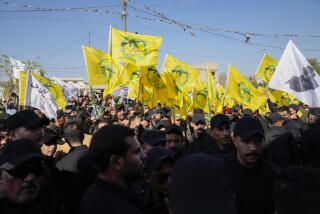U.S. Warns Iran of Retaliation for Attacks by Shia Muslims
- Share via
WASHINGTON — National security adviser Robert C. McFarlane warned Monday that the United States may retaliate against Iran if militant Shia Muslims attack U.S. interests in Lebanon or elsewhere in the Middle East.
“There is sufficient evidence that radical Shia terrorists are responsive to Iran for us to hold Tehran responsible,” McFarlane said in a speech that also asserted that the United States must be prepared to use military force to deter terrorism.
But he did not say specifically if military action against Iran is under consideration.
McFarlane also said the evidence indicates that the Soviet Union offers at least tacit support to terrorist groups. But he carefully avoided threatening to use force against Moscow.
‘Frozen Into Inaction’
He joined Secretary of State George P. Shultz, however, in advocating the occasional use of military action either to punish terrorists or to preempt terrorist attacks. And, like Shultz, McFarlane said that the United States cannot be “frozen into inaction” by the possibility that innocent by-standers might be hurt.
“If we do not use our forces where their use is clearly justified, we get neither the direct benefit nor the deterrent value of having such forces in the first place,” he said.
“We need that deterrent; we cannot proceed in such a way that terrorist groups or their sponsors feel they can make free, unopposed use of violence against us,” he added. “That deterrent cannot really be made to work unless we demonstrate our will to meet a terrorist challenge with a measured dose of force, occasionally.
Never Used Casually
“We have never used force casually or indifferently--this places us at a very marked disadvantage, I think, in responding to those who declare themselves to be our adversaries,” he said.
However, McFarlane offered very few specifics. He said the Reagan Administration intends to keep its precise intentions secret to keep terrorists off balance. “The element of surprise is an advantage. We must not relinquish it,” he said.
More to Read
Sign up for Essential California
The most important California stories and recommendations in your inbox every morning.
You may occasionally receive promotional content from the Los Angeles Times.










